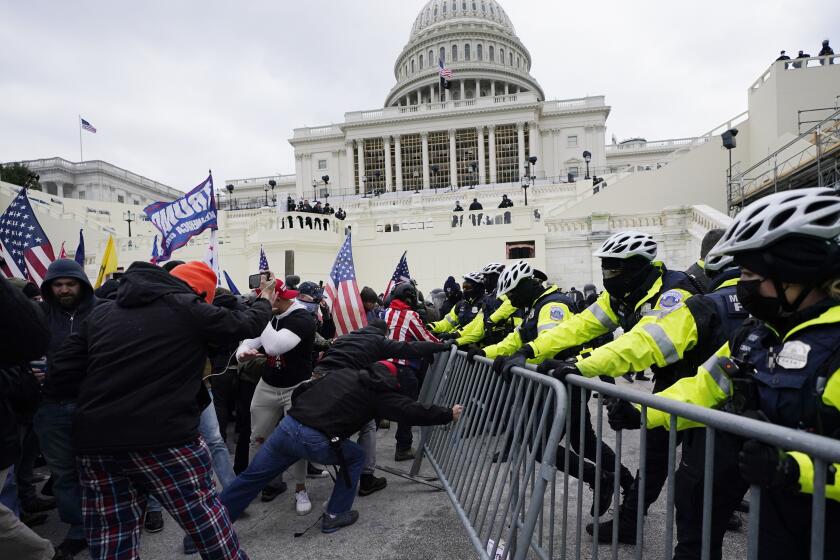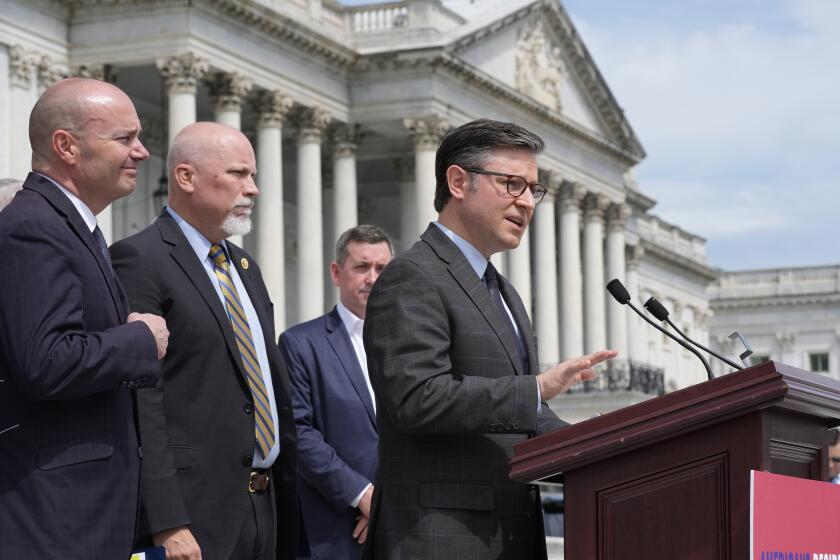Kaczynski’s Demands Halt Unabomber Trial
With his tearful mother and younger brother watching from the front row, accused Unabomber Theodore Kaczynski brought his trial to an abrupt halt Monday by demanding to air complaints about his attorneys and possibly about his brother’s presence in the courtroom.
Apparently caught off guard, U.S. District Judge Garland E. Burrell Jr. immediately ordered Kaczynski and his court-appointed defenders into a closed-door session, casting over the first day of the trial an air of mystery as thick as the capital’s winter fog.
After meeting with the defense in private for 4 1/2 hours, Burrell announced that he was delaying the trial’s start until Thursday, hoping to resolve the Montana recluse’s apparent rift with his attorneys once and for all.
The former UC Berkeley math professor took center stage Monday even before the jury could be seated to hear opening statements. About 8 a.m., Kaczynski, 55, with a neatly trimmed beard, wearing a cream-colored sweater, striped shirt and blue pants and carrying a large envelope, strode purposefully to the defense table. The table was covered with legal pads and several packs of Lifesavers.
Kaczynski, who has pleaded not guilty to murder-by-bombing charges, seemed to look past his 80-year-old mother, Wanda, and his younger brother David, whose arm was draped over their mother’s shoulder in comfort.
It was a dramatic moment that riveted the courtroom.
Neither had seen Kaczynski for at least a decade. It was David, 47, a social worker in upstate New York, who played the crucial role leading to his brother’s arrest. David tipped off the FBI that his brother’s views paralleled the Unabomber’s anti-technology manifesto published in 1995 in the New York Times and the Washington Post.
It was unclear whether Theodore Kaczynski knew that his estranged relatives would be spectators in the courtroom. Associated Press quoted an anonymous source saying that the closed-door meeting was in part sparked by Kaczynski’s objections to his brother being present.
But late Monday, Anthony Bisceglie, David Kaczysnki’s attorney, said that although his client’s presence may have affected Theodore Kaczynski’s courtroom demeanor, “it was not a direct issue” in the closed-door meeting.
When the court session began, the defendant drew the judge’s attention in a halting voice.
“Your Honor,” Kaczynski said, speaking for one of the few times in open court, “before we begin I’d like to read something I’ve written. It’s very important.
“I haven’t stood up because I’m under orders from the marshals not to stand up,” said Kaczynski, who until now had only given brief responses in courtroom appearances.
Burrell, appearing surprised, said that since his courtroom was jammed with about 100 spectators, he wanted to quickly ask the defense into his private chambers for a confidential discussion.
Reporters and spectators milled about the courtroom, with David and Wanda Kaczynski the focus of attention in the high-security setting of the John Moss Federal Building a few blocks from the state Capitol.
Across the courtroom aisle were the wife and 18-year-old son of Gilbert Murray, a timber industry executive who was killed in a 1995 Unabomber blast at his Sacramento office.
There was no public contact between the families; some of the victims or intended victims occasionally cast a wary eye toward the two Kaczynskis.
Also in the audience were Yale University computer scientist David Gelernter, wearing a black glove on a hand injured in a 1993 Unabomber blast, and UC San Francisco geneticist Charles Epstein, maimed in another 1993 attack.
After the court session Monday, FBI chaplain Mark O’Sullivan, speaking on behalf of Murray’s widow, Connie, and her family, said Kaczynski’s words “caught everyone off guard.”
He said they were disappointed and frustrated that the trial was delayed but they would patiently wait for events to unfold.
The unpredictability of the proceedings illustrates the defense’s dilemma--how to handle a client they believe is mentally ill but who refuses to allow a mental-illness defense.
Increasingly, in the weeks since jury selection began in November, the defendant’s behavior has posed a problem for Burrell as he attempts to prevent the trial from turning into a circus but at the same time ensure Kaczynski an adequate defense.
Federal prosecutors, who were barred from the private meeting, did little to hide their dismay over the turn of events. “We want this firmly and finally resolved before this jury is sworn,” lead prosecutor Robert Cleary told Burrell.
Outside the courtroom, one prosecution source acknowledged that even before court convened Monday, the government had been worried that Kaczynski--who faces the death penalty--might pull something “squirrelly.”
The primary dispute seems to revolve around Kaczynski’s on-again, off-again relationship with his attorneys, Judy Clarke and Quin Denvir. It was strained when the defenders sought to mount a defense claiming mental defects.
Previously, courtroom observers had suggested that flamboyant San Francisco defense attorney Tony Serra might be drafted as Kaczynski’s lawyer if differences with his current team were not ironed out.
During Monday’s meeting, Burrell apparently called Serra and a Sacramento defense lawyer.
Serra’s office issued a brief statement, saying only: “Judge Burrell did call this office this morning, and [Tony Serra] is still on vacation.” The other attorney, Kevin Clymo, could not be reached for comment.
Late Monday, Burrell added to the day’s intrigue by filing an order sealing “a written communication” that he received, apparently from Kaczynski, during the private meeting.
Some outside legal experts said the government had triggered the latest twist by refusing a plea bargain offer made by the defense. About a month ago, the defense offered a guilty plea in exchange for a life sentence.
“The Justice Department in some sense is reaping what it has sown,” UCLA law professor Peter Arenella said in a telephone interview. “If they had accepted the bargain, then we wouldn’t have the ongoing problem. . . . You have a severely mentally ill defendant trying to run his own defense.”
Two weeks ago, Burrell presided over similar private meetings with Kaczynski and his federal public defenders. The attorneys indicated that whatever split might have existed had been patched up.
Apparently as part of their efforts to mollify Kaczynski, his lawyers last week also abandoned plans to have mental health experts testify in the trial’s guilt phase about his alleged paranoid schizophrenic condition.
Prosecutor Cleary, who was rebuffed in court in efforts to learn about the nature of the confidential meetings, had no comment as he left the courtroom. Neither did defense counsel Clarke, whose mother sat with Wanda Kaczynski.
Theodore Kaczynski was arrested in April 1996 at his Montana cabin, where he had lived as a recluse for more than two decades. He is charged with four bombings, the attacks that killed Murray and computer store owner Hugh Scrutton, as well as the blasts that injured Epstein and Gelernter.
Burrell scheduled the jury to reassemble for the trial Thursday morning.
More to Read
Start your day right
Sign up for Essential California for news, features and recommendations from the L.A. Times and beyond in your inbox six days a week.
You may occasionally receive promotional content from the Los Angeles Times.






